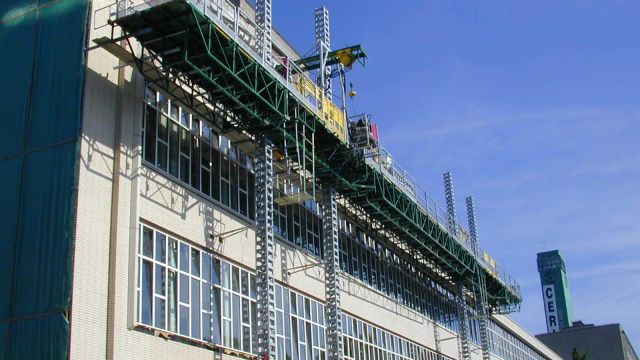To rent or buy: A manufacturer’s take
Ask The Expert
By Masonry
Masonry recently sat down with Hydro-Mobile’s director of safety and training, Kevin O’Shea, to learn more about how a globally renowned company approaches the area of equipment rental. Following is what he had to say.
Masonry: Which of your products do you consider rentable?
Kevin O’Shea: All of our products are rentable. We design mast climbing work platform product for many aspects of the construction/refurb/industrial markets, etc. The equipment, therefore, has a high degree of flexibility, lending itself to the rental market.
Masonry: How do renting and leasing differ, and what are the pros and cons of each?
O’Shea: Renting equipment has the advantage of being able to send it back to the owner when you no longer need it, and it’s easy to order additional equipment when you need it. However, rental equipment may not provide any profit from the equipment itself. The renter will certainly benefit from significant improvements in safety and productivity, leading to increased job profitability, but the renter may not see an equipment profit. The balance here is determined by utilization, flexibility and job costing.
Purchase and lease options normally apply to those companies who have, or who can, foresee a high utilization requirement for mast climbers. Leasing equipment is a viable option for many, but one important consideration in leasing is the residual value of the equipment after the prime period of the lease. For example, you might finance 75 percent of the equipment value over five or seven years. At the end of this period, you will be left with an asset that has a market value. Is your residual asset value realistic to that market value?
Masonry: Any advice on renting versus leasing versus buying?
O’Shea: Before you buy, rent. Get to know the equipment, learn how to use it properly, hone in on a type and configuration that works for you. Once you build up a level of comfort on the system, and have refined the use to provide real productivity and safety benefits, then think about buying.
Buying or leasing is a financial decision which is, on many occasions, about the needs and profile of the potential owner. Whether buying or leasing, it’s worth remembering that you now have enhanced responsibilities toward duty of care of the equipment. Working with the manufacturer to properly address those requirements is vital.
Masonry: When renting a mast climbing work platform to a mason, how is the mason's ability to safely operate it gauged or measured?
O’Shea: When you use a mast climber, you must be trained. That training follows a syllabus that is determined by the manufacturer and the industry. It will include testing. Regulations determine that an individual must be “qualified” to use, operate, erect or dismantle a mast climber. It is imperative that all personnel receive appropriate training.
Manufacturer certification is evidence of appropriate training.
Masonry: What signs should a mason look for to ensure that rental equipment has been well maintained?
O’Shea: Ask for the last annual and frequent inspection reports. Any signs and decals on the equipment should be legible. Equipment should have a good level of cleanliness, and everything should be functional. Guard rails, platform and mast section bracing should all be undamaged. Before using the equipment, make sure a qualified person conducts a pre-use inspection.
Originally published in Masonry magazine.
About the Author
Masonry, the official publication of the Mason Contractors Association of America, covers every aspect of the mason contractor profession - equipment and techniques, building codes and standards, business planning, promoting your business, legal issues and more. Read or subscribe to Masonry magazine at www.masonrymagazine.com.



















